Unit 1 Know yourself Period 3课件(共33张PPT,含内嵌视频)牛津译林版英语九年级上册
文档属性
| 名称 | Unit 1 Know yourself Period 3课件(共33张PPT,含内嵌视频)牛津译林版英语九年级上册 |
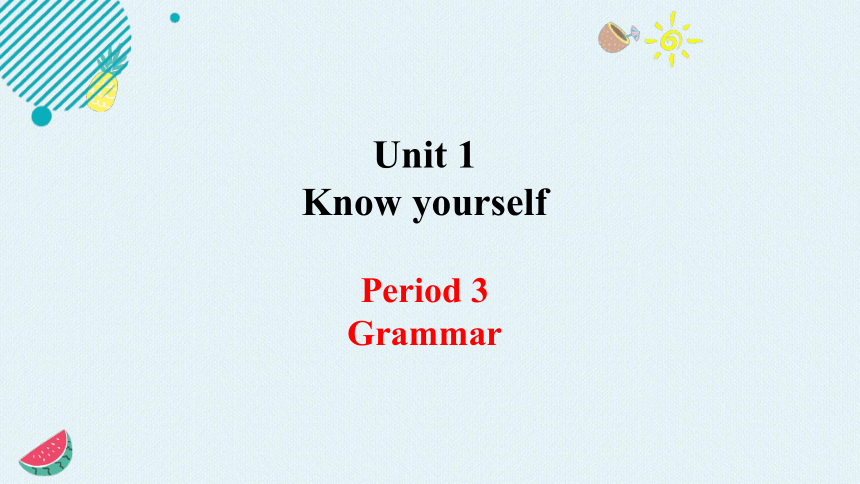
|
|
| 格式 | pptx | ||
| 文件大小 | 5.9MB | ||
| 资源类型 | 教案 | ||
| 版本资源 | 牛津译林版 | ||
| 科目 | 英语 | ||
| 更新时间 | 2024-07-21 16:26:52 | ||
图片预览

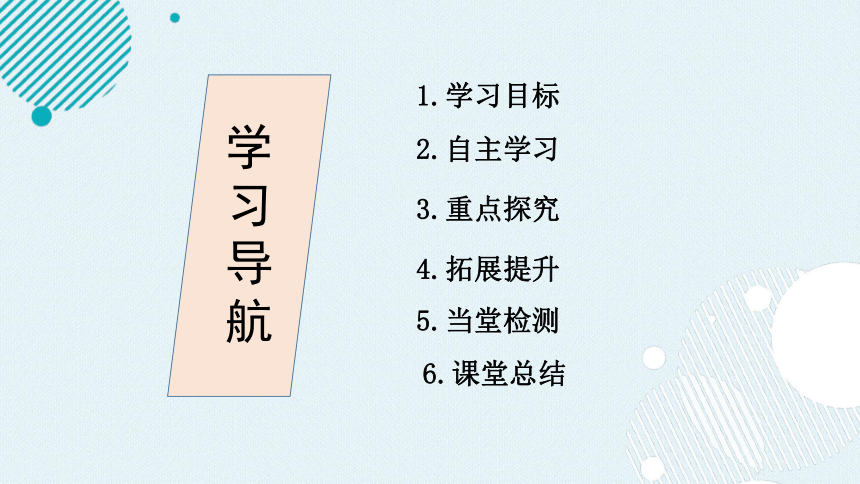
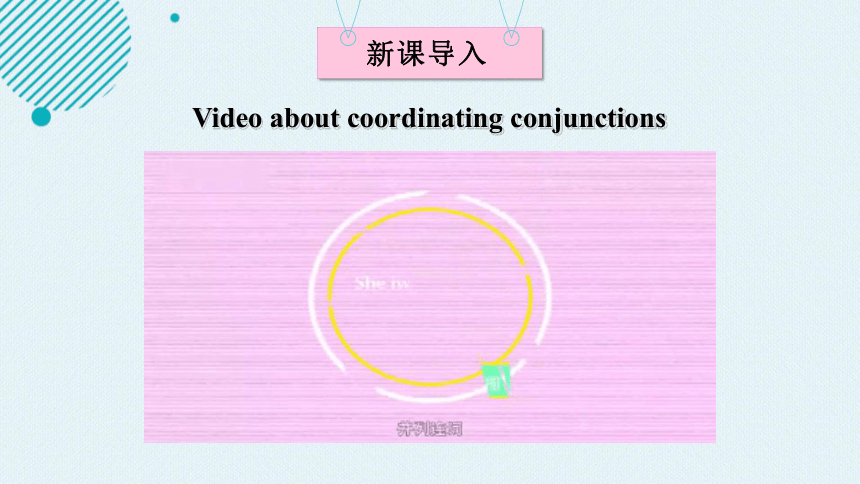

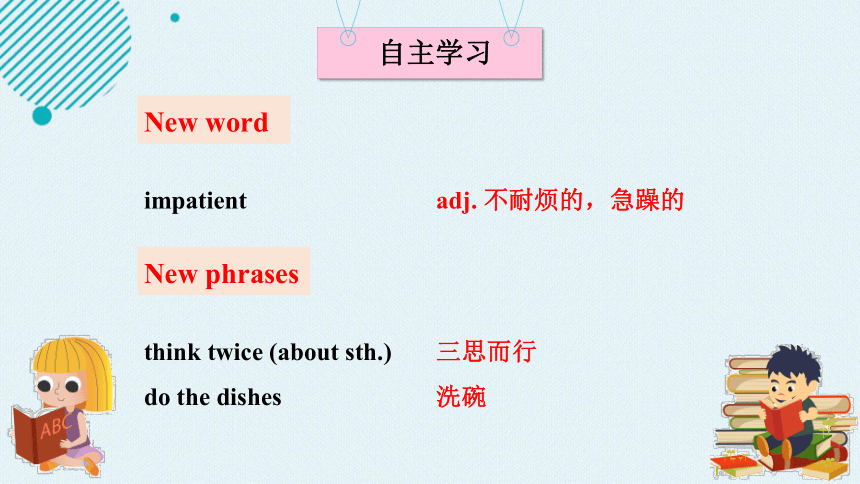
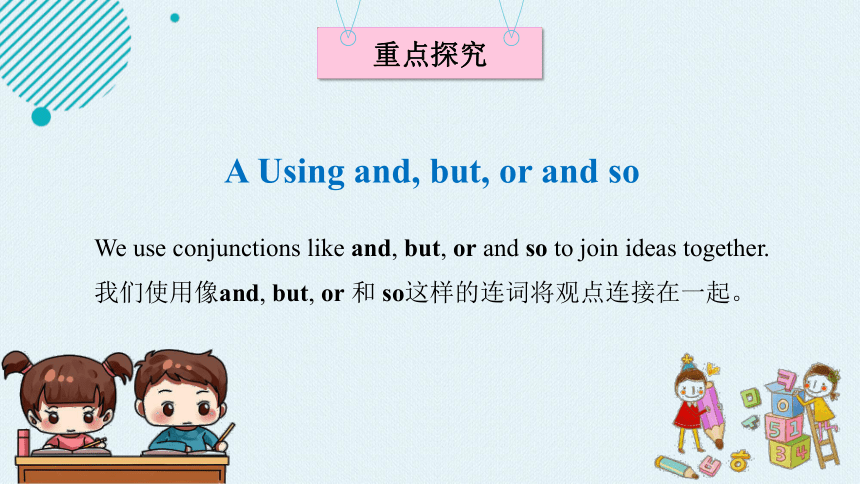
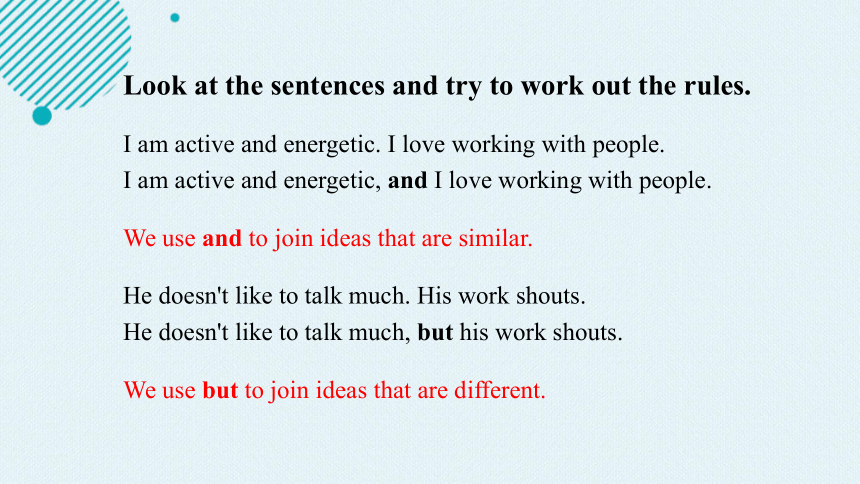




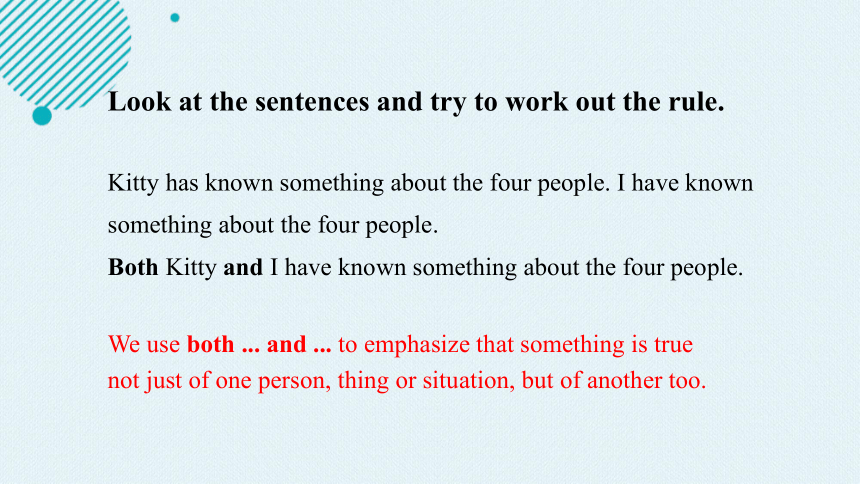
文档简介
(共33张PPT)
Unit 1
Know yourself
Period 3
Grammar
1.学习目标
3.重点探究
2.自主学习
学习导航
5.当堂检测
6.课堂总结
4.拓展提升
新课导入
Video about coordinating conjunctions
1.能熟悉并正确运用本课时的重点单词和短语。
2.能掌握并列连词and、but、or和so的用法。
3.能掌握并列连词both ... and ...、not only ... but (also) ...、either ... or ...和neither ... nor ...的用法。
学习目标
New word
自主学习
impatient
adj. 不耐烦的,急躁的
New phrases
think twice (about sth.)
do the dishes
三思而行
洗碗
重点探究
A Using and, but, or and so
We use conjunctions like and, but, or and so to join ideas together.
我们使用像and, but, or 和 so这样的连词将观点连接在一起。
I am active and energetic. I love working with people.
I am active and energetic, and I love working with people.
We use and to join ideas that are similar.
Look at the sentences and try to work out the rules.
He doesn't like to talk much. His work shouts.
He doesn't like to talk much, but his work shouts.
We use but to join ideas that are different.
I can be a good teacher. I can be a good doctor.
I can be a good teacher or a good doctor.
We use or to introduce another possibility.
Look at the sentences and try to work out the rules.
He does not like singing. He does not like dancing.
He does not like singing or dancing.
In negative sentences, we use or to join two or more ideas.
I want to share the best art with people.
I am always searching for something better or different.
I want to share the best art with people, so I am always searching for something better or different.
Look at the sentences and try to work out the rule.
We use so to express the result of something.
Millie wants to write about her classmates. Help her join her ideas with and, but, or or so.
1. Kitty is kind. Sometimes she is impatient.
_____________________________________________________
2. Billy would not accept others' advice. Billy would not think twice.
_____________________________________________________
3. Judy is gentle. Judy never gets angry with others.
_____________________________________________________
4. Suzy worries too much. She cannot sleep well sometimes.
_____________________________________________________
Kitty is kind, but sometimes she is impatient.
Billy would not accept others' advice or think twice.
Judy is gentle, and she never gets angry with others.
Suzy worries too much, so she cannot sleep well sometimes.
B Using both … and…, not only … but (also) …, either … or … and neither … nor …
We use conjunctions like both ... and ..., not only ... but (also)..., either ... or ..., and neither ... nor ... to connect the same part of two sentences to avoid repetition.
我们使用像both ... and ..., not only ... but (also)..., either ... or ..., 和 neither ... nor ...这样的连词把两个句子的相同部分连起来,避免重复。
Kitty has known something about the four people. I have known something about the four people.
Both Kitty and I have known something about the four people.
Look at the sentences and try to work out the rule.
We use both ... and ... to emphasize that something is true not just of one person, thing or situation, but of another too.
Carelessness will be a disaster to ourselves.
Carelessness will be a disaster to patients.
Carelessness will be a disaster not only to ourselves but (also) to patients.
Look at the sentences and try to work out the rule.
We use not only … but (also) … to add another fact to something you have mentioned.
You take the lead. You fall behind.
You either take the lead or fall behind.
Look at the sentences and try to work out the rule.
We use either ... or ... to mean one or the other, this or that, he or she, etc.
My parents do not think I can make a good accountant.
I do not think I can make a good accountant.
Neither my parents nor I think I can make a good accountant.
Look at the sentences and try to work out the rule.
We use neither ... nor ... to mean not this one and not the other, not this and not that, not he and not she, etc.
Both Kitty and Simon are energetic.
Not only the students but (also) their teacher knows about the four people.
Either Simon or David is ready to take on new challenges.
Neither Millie nor her friends know about types of personality.
Look at the sentences and try to work out the rule.
When we use the conjunctions to connect two subjects, the verb form after both ... and ... is always plural, but the verb form after not only ... but (also)..., either ... or ... and neither ... nor ... can be plural or singular, depending on the subject closer to the verb.
B1. Amy is writing about what her family does at the weekend. Help her complete the sentences with the correct conjunctions.
not only
but also
Not only but also
1. ______________ my dad ______________ my mum goes to work at
the weekend. We visit my grandparents on Saturdays.
2. ______________ my mum ______________ my grandma are good at
cooking. They cook lunch for us.
3. ______________ my mum ______________ my dad does the dishes
after lunch. I also help with it.
4. In the afternoon, my grandpa and my dad ______________ play chess
______________ chat with each other.
5. My mum ______________ helps clean the rooms for my grandparents
______________ does some shopping for them.
Neither nor
Both and
Either or
either
or
not only
but also
either
or
B2. Amy and Suzy are talking about what jobs their classmates can do in the plete their conversation with the correct conjunctions and the correct forms of the verbs in brackets.
Amy:I've learnt about jobs and personalities recently.
Suzy:Really What jobs do you think our classmates can do in the future
Amy:I think Millie would make an excellent teacher. She's (1)
_______ willing to work with children ________ patient with them.
Suzy:What about Simon
Amy:He's active and good at playing football. I think he can be (2)
________ a PE teacher _______a football player.
not only
but also
or
either
Suzy:Do you think David and Lisa can be artists
Amy:They're very organized, but artists should be creative. (3) ________
David's ____ Lisa's personality (4) ______ (be) suitable for being
an artist, I'm afraid.
Suzy:Who can be a manager
Amy:(5) _________ Billy _________ Paul (6) ______ (be) very
confident and energetic. I think they can be managers.
Suzy:How can I learn about jobs and personalities
Amy:You can read about them (7) ______from some books _______ on
the Internet.
Neither
is
nor
not only but also
are
both and
is
not only but also
both and
拓展提升
1. Billy would not think twice. 比利不会三思而行。
think twice (about sth.) 三思而行
e.g. You should think twice about employing someone you've
never met. 雇用素不相识的人应三思而行。
Language Points
2. Either my mum or my dad does the dishes after lunch.
午饭后不是我妈妈就是我爸爸洗碗。
do the dishes 洗碗
e.g. Lucy often helps her mother do the dishes after supper.
露茜通常在晚饭后帮妈妈洗碗。
并列连词and、but、or和so
我们可以用并列连词and、but、or和so来连接单词、短语或者句子。如:
our English teacher is kind and helpful.
我们的英语老师既和蔼又乐于助人。
The boy is not very tall but he runs very fast.
这个男孩虽然个子不高,但跑得很快。
Do you often go home on foot or by bicycle
你经常步行回家还是骑自行车回家?
She was ill, so she did not go to school.
她生病了,所以没去上学。
注意:并列连词可以用来表示并列关系、转折关系、选择关系或因果关系等。
并列连词and意思是“和,又”,表达并列关系。如:
Mike likes playing football and singing songs.
迈克喜欢踢足球和唱歌。
并列连词but意思是“但是”,表示转折关系,所以连接的成分意思往往相反或相对。如:
My uncle bought me a watch, but I did not like it.
叔叔给我买了一块手表,可是我不喜欢。
并列关系or意思是“或者”,表达选择关系。如:
Which do you like better, juice or coffee
果汁和咖啡,你更喜欢哪一个?
注意:在否定句中并列成分通常用or连接,而不用and。如:
I cannot speak Japanese or French.
我不会说日语和法语。
并列连词so意思是“因此,所以”,表达因果关系,常用来选择两个简单句。如:
It began to rain, so we went home.
开始下雨了,所以我们就回家了。
注意:并列连词so和从属连词because(因为)不能一起使用。如:
The dog was hungry, so we gave it something to eat.(√)
Because the dog was hungry, so we gave it something to eat. (×)
并列连词both … and…, not only … but (also) …, either … or … and neither … nor …
both ... and ...、not only ... but (also) ...、either ... or ... 和neither ... nor ...都是常见的并列连词,它们可以连接两个并列的主语、谓语、宾语、表语、状语等。
both ... and ... 意思是“……和……两者都;既……又……”。如:
Both New York and London have traffic problems.
纽约和伦敦都存在交通问题。
He can both swim and skate. 他既会游泳又会滑冰。
注意:当both ... and ... 连接的两个成分在句中作主语时,谓语动词总是用复数形式。如:
Both she and I are good at English. 她和我都擅长英语。
not only ... but (also) ... 意思是“不但……而且……;不仅……还有……”,其中also可以省略。如:
Not only Mr Lin but (also) his son joined the charity walk.
不但林先生而且他的儿子也参加了慈善行走活动。
They speak English not only in class but (also) at home.
他们不仅在课堂上说英语,在家里也说。
注意:当not only ... but (also) ... 连接的两个名词作主语时,
其谓语动词应与最近的一个主语在人称和数上保持一致,这
就是我们通常说的“就近原则”。如:
Not only the students but (also) Mr Li has lunch at school.
不仅学生们,还有李老师都在学校吃午饭。
either ... or ... 意思是“要么……要么……;或者……或者……;不是……就是……”,用于连接两个表示选择关系的词。如:
When the girl is happy, she either sings or dances.
那个女孩高兴时,不是唱就是跳。
注意:当either ... or ... 连接两个主语时,应遵循“就近原则”。如:
Either you or I am going there tomorrow.
明天要么你去那里,要么我去那里。
neither ... nor ... 意思是“既不……也不……”,具有否定含义。如:
It is neither too cold nor too dry in winter here.
这里冬天既不太冷也不太干。
注意:当neither ... nor ... 连接两个主语时,也应遵循“就近原则”。如:
Neither Dad nor Mum is at home today.
今天父母都不在家。
当堂检测
一、用and, but, or或so改写句子。
1. It is sunny. Our city looks more beautiful.
2. He invited me to the meeting. I am very busy so I can't go.
3. On Sunday you can go horse riding. You can listen to pop music
at home.
4. The little boy is very young. He knows few things.
It is sunny, and our city looks more beautiful.
He invited me to the meeting, but I am very busy so I can't go.
On Sunday you can go horse riding or listen to pop music at home.
The little boy is very young, so he knows few things.
二、用所给动词的适当形式填空。
1. Both my brothers _______ ( live) in Italy.
2. Neither of his parents _______ (like) butter and cheese.
3. Either you or I _______ (be) wrong.
4. Neither Daniel nor Suzy _______ (be) at school.
5. Both Lily and Lucy often _______ (watch) movies.
6. Not only you but also he _______ (be) tired of having one
examination after another
live
likes
am
is
watch
is
课堂总结
重点单词:
impatient, think twice (about sth.), do the dishes
Unit 1
Period 3
并列连词and、but、or和so:
and表达_____关系,but表达_____关系,or表达_____关系,so表达_____关系;
并列连词both … and…, not only … but (also) …, either … or … 和 neither … nor …:
1.上述并列连接词可以连接_____、_____、宾语、表语、状语等;
2.除both...and...连接的两个成分做主语时,谓语动词用______形式外,其他都遵循_____原则。
并列
转折
选择
因果
主语
谓语
复数
就近
Unit 1
Know yourself
Period 3
Grammar
1.学习目标
3.重点探究
2.自主学习
学习导航
5.当堂检测
6.课堂总结
4.拓展提升
新课导入
Video about coordinating conjunctions
1.能熟悉并正确运用本课时的重点单词和短语。
2.能掌握并列连词and、but、or和so的用法。
3.能掌握并列连词both ... and ...、not only ... but (also) ...、either ... or ...和neither ... nor ...的用法。
学习目标
New word
自主学习
impatient
adj. 不耐烦的,急躁的
New phrases
think twice (about sth.)
do the dishes
三思而行
洗碗
重点探究
A Using and, but, or and so
We use conjunctions like and, but, or and so to join ideas together.
我们使用像and, but, or 和 so这样的连词将观点连接在一起。
I am active and energetic. I love working with people.
I am active and energetic, and I love working with people.
We use and to join ideas that are similar.
Look at the sentences and try to work out the rules.
He doesn't like to talk much. His work shouts.
He doesn't like to talk much, but his work shouts.
We use but to join ideas that are different.
I can be a good teacher. I can be a good doctor.
I can be a good teacher or a good doctor.
We use or to introduce another possibility.
Look at the sentences and try to work out the rules.
He does not like singing. He does not like dancing.
He does not like singing or dancing.
In negative sentences, we use or to join two or more ideas.
I want to share the best art with people.
I am always searching for something better or different.
I want to share the best art with people, so I am always searching for something better or different.
Look at the sentences and try to work out the rule.
We use so to express the result of something.
Millie wants to write about her classmates. Help her join her ideas with and, but, or or so.
1. Kitty is kind. Sometimes she is impatient.
_____________________________________________________
2. Billy would not accept others' advice. Billy would not think twice.
_____________________________________________________
3. Judy is gentle. Judy never gets angry with others.
_____________________________________________________
4. Suzy worries too much. She cannot sleep well sometimes.
_____________________________________________________
Kitty is kind, but sometimes she is impatient.
Billy would not accept others' advice or think twice.
Judy is gentle, and she never gets angry with others.
Suzy worries too much, so she cannot sleep well sometimes.
B Using both … and…, not only … but (also) …, either … or … and neither … nor …
We use conjunctions like both ... and ..., not only ... but (also)..., either ... or ..., and neither ... nor ... to connect the same part of two sentences to avoid repetition.
我们使用像both ... and ..., not only ... but (also)..., either ... or ..., 和 neither ... nor ...这样的连词把两个句子的相同部分连起来,避免重复。
Kitty has known something about the four people. I have known something about the four people.
Both Kitty and I have known something about the four people.
Look at the sentences and try to work out the rule.
We use both ... and ... to emphasize that something is true not just of one person, thing or situation, but of another too.
Carelessness will be a disaster to ourselves.
Carelessness will be a disaster to patients.
Carelessness will be a disaster not only to ourselves but (also) to patients.
Look at the sentences and try to work out the rule.
We use not only … but (also) … to add another fact to something you have mentioned.
You take the lead. You fall behind.
You either take the lead or fall behind.
Look at the sentences and try to work out the rule.
We use either ... or ... to mean one or the other, this or that, he or she, etc.
My parents do not think I can make a good accountant.
I do not think I can make a good accountant.
Neither my parents nor I think I can make a good accountant.
Look at the sentences and try to work out the rule.
We use neither ... nor ... to mean not this one and not the other, not this and not that, not he and not she, etc.
Both Kitty and Simon are energetic.
Not only the students but (also) their teacher knows about the four people.
Either Simon or David is ready to take on new challenges.
Neither Millie nor her friends know about types of personality.
Look at the sentences and try to work out the rule.
When we use the conjunctions to connect two subjects, the verb form after both ... and ... is always plural, but the verb form after not only ... but (also)..., either ... or ... and neither ... nor ... can be plural or singular, depending on the subject closer to the verb.
B1. Amy is writing about what her family does at the weekend. Help her complete the sentences with the correct conjunctions.
not only
but also
Not only but also
1. ______________ my dad ______________ my mum goes to work at
the weekend. We visit my grandparents on Saturdays.
2. ______________ my mum ______________ my grandma are good at
cooking. They cook lunch for us.
3. ______________ my mum ______________ my dad does the dishes
after lunch. I also help with it.
4. In the afternoon, my grandpa and my dad ______________ play chess
______________ chat with each other.
5. My mum ______________ helps clean the rooms for my grandparents
______________ does some shopping for them.
Neither nor
Both and
Either or
either
or
not only
but also
either
or
B2. Amy and Suzy are talking about what jobs their classmates can do in the plete their conversation with the correct conjunctions and the correct forms of the verbs in brackets.
Amy:I've learnt about jobs and personalities recently.
Suzy:Really What jobs do you think our classmates can do in the future
Amy:I think Millie would make an excellent teacher. She's (1)
_______ willing to work with children ________ patient with them.
Suzy:What about Simon
Amy:He's active and good at playing football. I think he can be (2)
________ a PE teacher _______a football player.
not only
but also
or
either
Suzy:Do you think David and Lisa can be artists
Amy:They're very organized, but artists should be creative. (3) ________
David's ____ Lisa's personality (4) ______ (be) suitable for being
an artist, I'm afraid.
Suzy:Who can be a manager
Amy:(5) _________ Billy _________ Paul (6) ______ (be) very
confident and energetic. I think they can be managers.
Suzy:How can I learn about jobs and personalities
Amy:You can read about them (7) ______from some books _______ on
the Internet.
Neither
is
nor
not only but also
are
both and
is
not only but also
both and
拓展提升
1. Billy would not think twice. 比利不会三思而行。
think twice (about sth.) 三思而行
e.g. You should think twice about employing someone you've
never met. 雇用素不相识的人应三思而行。
Language Points
2. Either my mum or my dad does the dishes after lunch.
午饭后不是我妈妈就是我爸爸洗碗。
do the dishes 洗碗
e.g. Lucy often helps her mother do the dishes after supper.
露茜通常在晚饭后帮妈妈洗碗。
并列连词and、but、or和so
我们可以用并列连词and、but、or和so来连接单词、短语或者句子。如:
our English teacher is kind and helpful.
我们的英语老师既和蔼又乐于助人。
The boy is not very tall but he runs very fast.
这个男孩虽然个子不高,但跑得很快。
Do you often go home on foot or by bicycle
你经常步行回家还是骑自行车回家?
She was ill, so she did not go to school.
她生病了,所以没去上学。
注意:并列连词可以用来表示并列关系、转折关系、选择关系或因果关系等。
并列连词and意思是“和,又”,表达并列关系。如:
Mike likes playing football and singing songs.
迈克喜欢踢足球和唱歌。
并列连词but意思是“但是”,表示转折关系,所以连接的成分意思往往相反或相对。如:
My uncle bought me a watch, but I did not like it.
叔叔给我买了一块手表,可是我不喜欢。
并列关系or意思是“或者”,表达选择关系。如:
Which do you like better, juice or coffee
果汁和咖啡,你更喜欢哪一个?
注意:在否定句中并列成分通常用or连接,而不用and。如:
I cannot speak Japanese or French.
我不会说日语和法语。
并列连词so意思是“因此,所以”,表达因果关系,常用来选择两个简单句。如:
It began to rain, so we went home.
开始下雨了,所以我们就回家了。
注意:并列连词so和从属连词because(因为)不能一起使用。如:
The dog was hungry, so we gave it something to eat.(√)
Because the dog was hungry, so we gave it something to eat. (×)
并列连词both … and…, not only … but (also) …, either … or … and neither … nor …
both ... and ...、not only ... but (also) ...、either ... or ... 和neither ... nor ...都是常见的并列连词,它们可以连接两个并列的主语、谓语、宾语、表语、状语等。
both ... and ... 意思是“……和……两者都;既……又……”。如:
Both New York and London have traffic problems.
纽约和伦敦都存在交通问题。
He can both swim and skate. 他既会游泳又会滑冰。
注意:当both ... and ... 连接的两个成分在句中作主语时,谓语动词总是用复数形式。如:
Both she and I are good at English. 她和我都擅长英语。
not only ... but (also) ... 意思是“不但……而且……;不仅……还有……”,其中also可以省略。如:
Not only Mr Lin but (also) his son joined the charity walk.
不但林先生而且他的儿子也参加了慈善行走活动。
They speak English not only in class but (also) at home.
他们不仅在课堂上说英语,在家里也说。
注意:当not only ... but (also) ... 连接的两个名词作主语时,
其谓语动词应与最近的一个主语在人称和数上保持一致,这
就是我们通常说的“就近原则”。如:
Not only the students but (also) Mr Li has lunch at school.
不仅学生们,还有李老师都在学校吃午饭。
either ... or ... 意思是“要么……要么……;或者……或者……;不是……就是……”,用于连接两个表示选择关系的词。如:
When the girl is happy, she either sings or dances.
那个女孩高兴时,不是唱就是跳。
注意:当either ... or ... 连接两个主语时,应遵循“就近原则”。如:
Either you or I am going there tomorrow.
明天要么你去那里,要么我去那里。
neither ... nor ... 意思是“既不……也不……”,具有否定含义。如:
It is neither too cold nor too dry in winter here.
这里冬天既不太冷也不太干。
注意:当neither ... nor ... 连接两个主语时,也应遵循“就近原则”。如:
Neither Dad nor Mum is at home today.
今天父母都不在家。
当堂检测
一、用and, but, or或so改写句子。
1. It is sunny. Our city looks more beautiful.
2. He invited me to the meeting. I am very busy so I can't go.
3. On Sunday you can go horse riding. You can listen to pop music
at home.
4. The little boy is very young. He knows few things.
It is sunny, and our city looks more beautiful.
He invited me to the meeting, but I am very busy so I can't go.
On Sunday you can go horse riding or listen to pop music at home.
The little boy is very young, so he knows few things.
二、用所给动词的适当形式填空。
1. Both my brothers _______ ( live) in Italy.
2. Neither of his parents _______ (like) butter and cheese.
3. Either you or I _______ (be) wrong.
4. Neither Daniel nor Suzy _______ (be) at school.
5. Both Lily and Lucy often _______ (watch) movies.
6. Not only you but also he _______ (be) tired of having one
examination after another
live
likes
am
is
watch
is
课堂总结
重点单词:
impatient, think twice (about sth.), do the dishes
Unit 1
Period 3
并列连词and、but、or和so:
and表达_____关系,but表达_____关系,or表达_____关系,so表达_____关系;
并列连词both … and…, not only … but (also) …, either … or … 和 neither … nor …:
1.上述并列连接词可以连接_____、_____、宾语、表语、状语等;
2.除both...and...连接的两个成分做主语时,谓语动词用______形式外,其他都遵循_____原则。
并列
转折
选择
因果
主语
谓语
复数
就近
